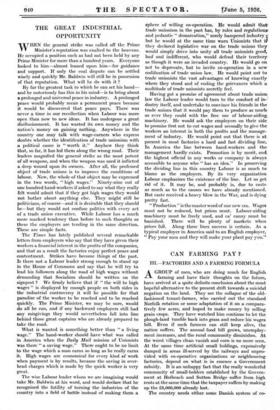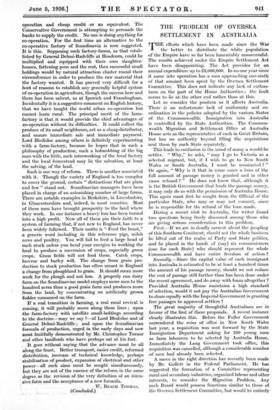CAN FARMING PAY ?
III.—FACTORIES AND A FARMING FORMULA AGROUP of men, who are dOing much for English farming and have their thoughts on the future, have arrived at a quite definite conclusion about the Most hopeful alternative to the present drift towards a suicidal negation on the land. They see the collapse of the old-. fashioned tenant-farmer, who carried out the standard Norfolk rotation or some' adaptation of it on a compara- tively few acres, and hoped to make money by selling grain crops. They have watched him continue to let the plough-land tumble back into grass and reduce his wages bill. . Even if such farmers can still keep alive, the nation suffers. The annual food bill grOws, unemploy- ment increases, and the rural community diminishes. At the worst villages clean vanish and corn is no more seen.. At the same time artificial small holdings, expensively dumped in areas ill-served by the railways and unpro- -vided with co-operative organizations or neighbouring factories, depend on what is in essence a Government subsidy. It is an unhappy fact that the really wonderful- community of small-holders established by the Govern- ment at Holbeach and Sutton Bridge suffer from high rents at the same time that the taxpayer suffers by making up the £8,000,000 already lost.
The country needs either some Danish system of co- operation and cheap credit or an equivalent. The Conservative Government is attempting to persuade the banks to supply the credit. No one is doing anything for co-operation. For the first time an alternative to the co-operative factory of Scandinavia is now suggested. It is this. Supposing such factory-farms, as that estab- lished by General Define-Radcliffe at Headcorn, could be multiplied and equipped with their own slaughter- houses, fattening pens and the rest, then successful small holdings would by natural attraction cluster round their circumference in order to produce the raw material that the factory wanted. It has proved very difficult for a host of reasons to establish any generally helpful system of co-operation in agriculture, though the success here and there has been salient, as at Ipswich and Framlingham. Incidentally it is a suggestive comment on English history, that we have taught the world urban co-operation but cannot learn rural. The principal merit of the farm- factory is that it would provide the chief advantages of co-operation without its difficulties. It could collect the produce of its small neighbours, act as a cheap distributor, and ensure immediate sale and immediate payment. Lord Bledisloe among others is definitely experimenting with a farm-factory, because he hopes that in such a philosophy of production, such a hobnobbing of the big man with the little, such interworking of the local factory and the local homestead may lie the salvation, at least the salving, of the land.
Such is one way of reform. There is another associated with it. Though the variety of England is too complex to cover the ground, certain " distinctions that are plain and few " stand out. Scandinavian managers have been placed in charge of an astonishing number of large farms. There are notable examples in Berkshire, in Lincolnshire, in Gloucestershire and, indeed, in most counties. Most of these men have brought prosperity to the land where they work. In one instance a heavy loss has been turned into a high profit. Now all of them pin their faith to a system of farming that, if not new to England, has never been widely followed. Their motto is " Feed the beast," a generic word including in this reference pigs, milch cows and poultry. You will fail to feed a large head of such stock unless you bend your energies to working the land to produce a succession of crops, especially green crops. Grass fields will not feed them. Catch crops, lucerne and barley will. The change from grain pro- duction to stock production has often meant in England a change from ploughland to grass. It should mean more work for the plough and not less. A properly run dairy farm on the Scandinavian model employs more men to the hundred acres than a good grain farm and produces more from the land, by concentrating on artificially grown fodder consumed on the farm.
If a real transition in farming, a real rural revival. is coming, it will probably move along these lines ; upon the farm-factory with satellite small-holdings according to the doctrine—may we say ?—of. Lord Bledisloe and of General Delme-Radcliffe ; and upon the Scandinavian formula of production, urged. in the early days and now most fruitfully demonstrated by Mr. Christopher Tumor and other landlords who have perhaps sat at his feet.
It goes without saying that the advance must be . all along the front. Better transport, easier credit, reformed distribution, increase of technical knowledge, perhaps .stabilization of product, expansion of electrical and other power—all such aims must be sought simultaneously, but they are not of the essence of the reform in the same degree as the revision of the, very definition of an inten- sive farm and the acceptance of a new formula.











































 Previous page
Previous page